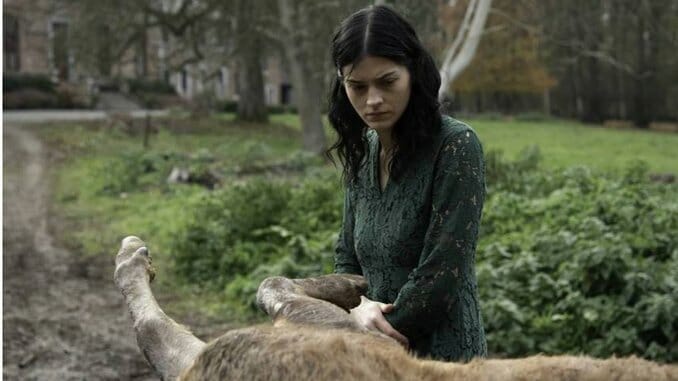Let’s agree to retire horror’s “psychological” appellation. At the very least, let’s send it on a sabbatical for much-needed relaxation and personal enrichment. At present, this niche is a trap for filmmakers scouring cabinets for spice to season their work: “Psychological” opens a trap door to easy workarounds for developing atmosphere, movies that rely on bait-and-switch chicanery instead of craftsmanship. There’s little worse than watching a plot unfold and finding out at the end that you’ve been had by parlor tricks, and that’s what makes Christian Neuman’s Skin Walker a broadly frustrating experience.
Regine (Amber Anderson), living in the city after escaping her rural home years ago, is compelled to return to the family estate for her awful grandmother’s funeral. On arrival she’s drawn back into her past, confronting the abuses she witnessed as a girl, including her deformed baby brother Isaac’s infanticide at a mere days old. But there’s a question mark: Did Isaac actually die? Robert (Jefferson Hall), an old family friend, thinks he still lives, and that he in fact murdered Regine’s grandmother. Her father, Claus (Udo Kier), believes otherwise, but acts shady enough to rouse the suspicion of Regine and the audience. None of this bodes well for her, what with her psyche having the constitution of crème brûlée. She’s already cracked before she makes the trip to the sticks.
There’s no movie Kier can’t improve by sauntering into frame and batting his steely blue eyes. Here, his peepers represent welcome gravity for Skin Walker’s anti-reality. Describing the movie as “surreal” doesn’t do any justice to how unglued from objectivity Neuman’s script gets as Regine, in recounting bygone traumas, opens the door for new ones. Dredging up one bad memory begets a rush of worse memories, and Regine has no meaningful coping mechanisms for dealing with shame and embarrassment buried deep in the recesses of her subconscious. In short, she’s a fucking mess. When Robert tells her that her dead baby brother is alive, she gets even messier. Appropriately, but not exactly happily, the movie gets messier, too. Neuman piles flashback on flashback into the edit, spending as much time in Regine’s mind as in the world itself, perhaps even more.
The effort Neuman makes to anchor the audience to Regine’s point of view, the lengths he goes to literally put us in her head, undermines Skin Walker as a narrative: The less we’re able to trust what the camera shows, the more the story loses structure. So goes the challenge of psychological horror. When storytelling functions are disrupted by questions of what’s real versus what’s imagined, character makes the best ballast. Skin Walker’s best character is Claus and its best performance is Kier’s, but good as he is (and he’s very good), he alone can’t keep the film from floating into the aether. Frankly, Claus cuts a more interesting figure, tragic and furious over the direction his life has taken since meeting Regine’s mother, Rose (Sophie Mousel), locked away in the madhouse having snapped after Isaac’s death.
“You’re a horrible person,” Kier says and breathes at the camera in the film’s best scene: an extended long shot slowly zooming in on Claus sitting alone at the head of the dining room table, a cool, composed image of grief as he rants straight through the fourth wall. “Horrible person! You ruined me. You ruined my life!” He’s speaking to the ghost of his own dead mother, addressing the scars left on him by the battleaxe that raised him, and the heft Kier gives to Claus’ aggrieved outrage has more power than the stock confusion loaded into Regine’s character. He’s the person Skin Walker probably should’ve been about. Neuman gives him more definition on the page than Regine, and Kier’s such a good actor that Anderson can’t match his skill at shading in Claus’ background and his motivations. Even Neuman falls behind Kier’s heavy lifting.
But the great German thesp isn’t to blame for Skin Walker’s stumbles. The film is an exercise in wasting a premise for cheap smoke and mirrors. Even when at least one of the big questions is answered, there persists a nagging question of whether it’s really been answered Neuman’s tricks and misidrections read increasingly as smug over time, as if the screenplay was written with an obnoxious through-line of self-satisfaction at its twisty-turny qualities. But its proudest moment, and quite likely not by Neuman’s design, belongs to Kier, perfectly straddling a line of surreality while acting circles around the rest of the picture. All on his own, Kier handily proves out the weaknesses of psych-forward horror by doing what that subgenre sets out to do: blurring perspective lines. Skin Walker blurs nothing. Instead, it smears.
Director: Christian Neuman
Writer: Christian Neuman
Starring: Amber Anderson, Udo Kier, Jefferson Hall, Sophie Mousel, Luc Schlitz
Release Date: August 4, 2020
Bostonian culture journalist Andy Crump covers the movies, beer, music, and being a dad for way too many outlets, perhaps even yours. He has contributed to Paste since 2013. You can follow him on Twitter and find his collected work at his personal blog. He’s composed of roughly 65% craft beer.
